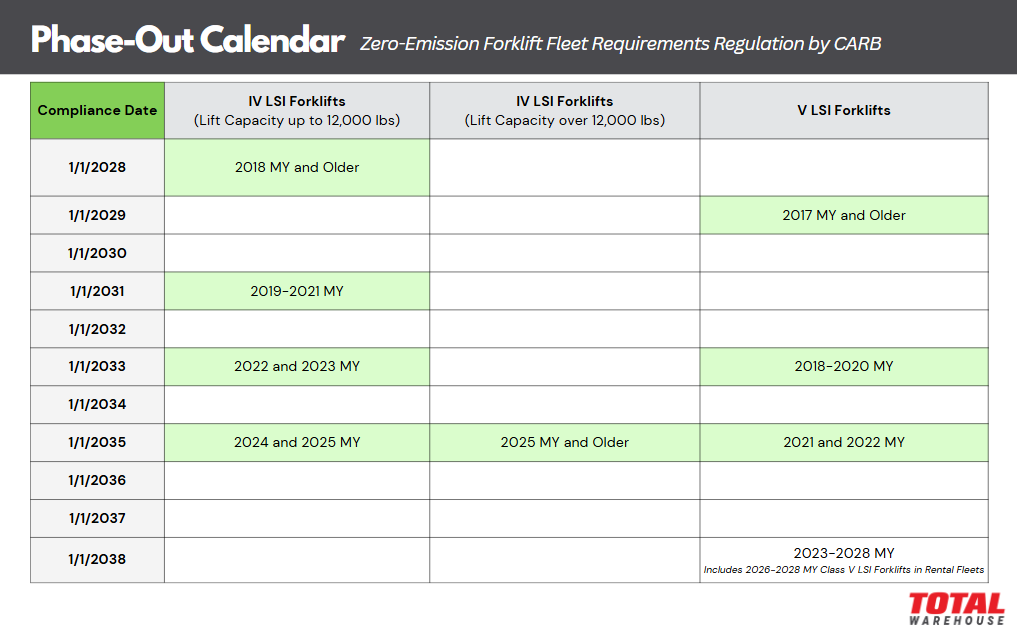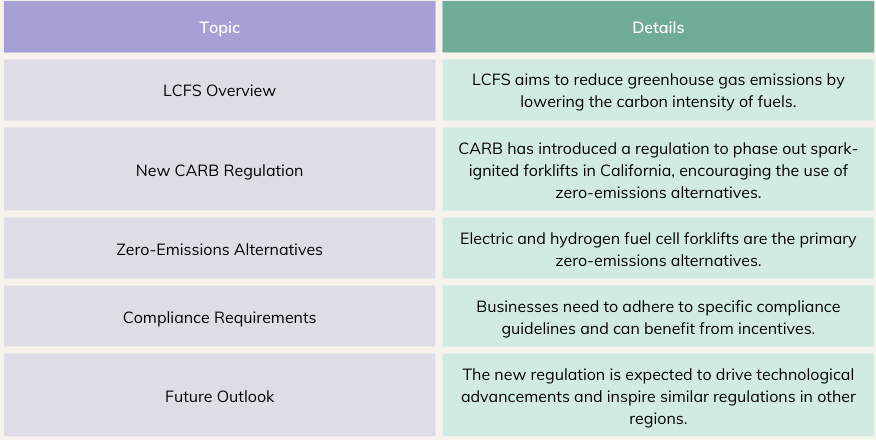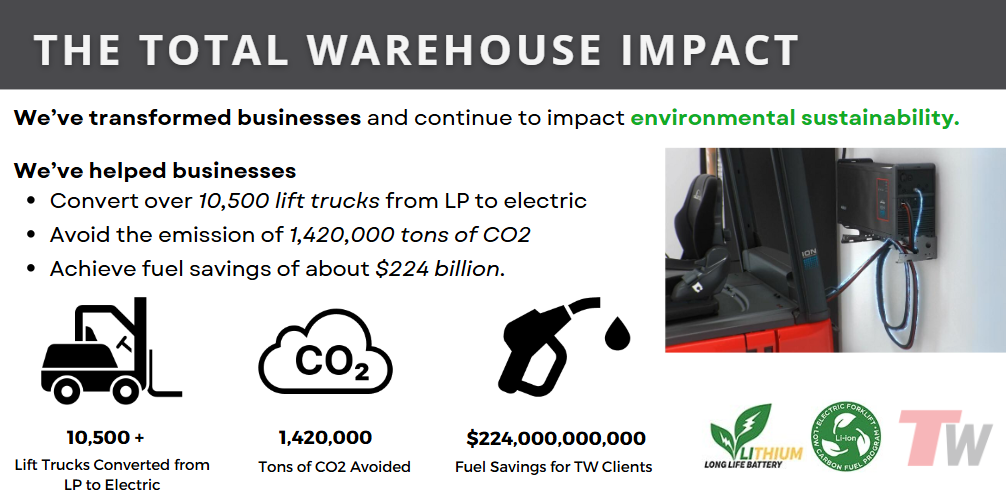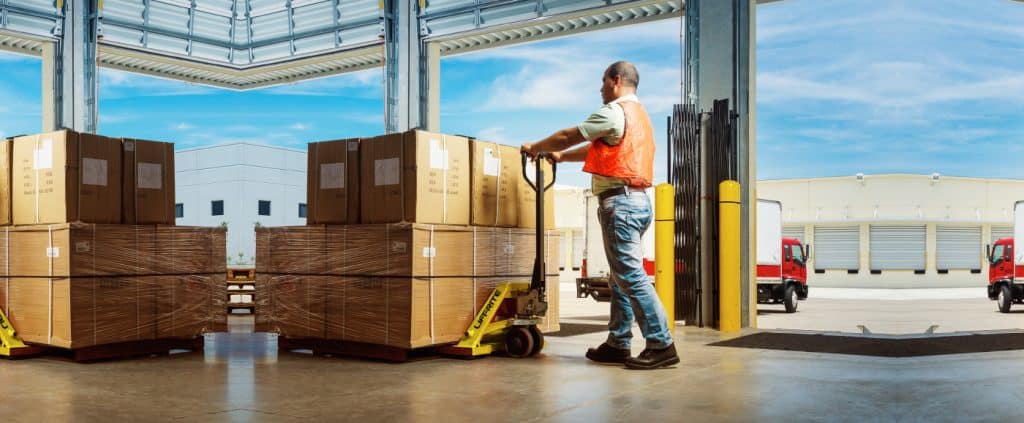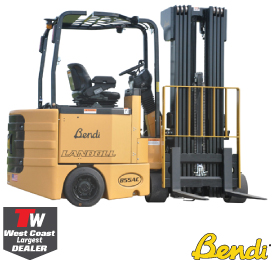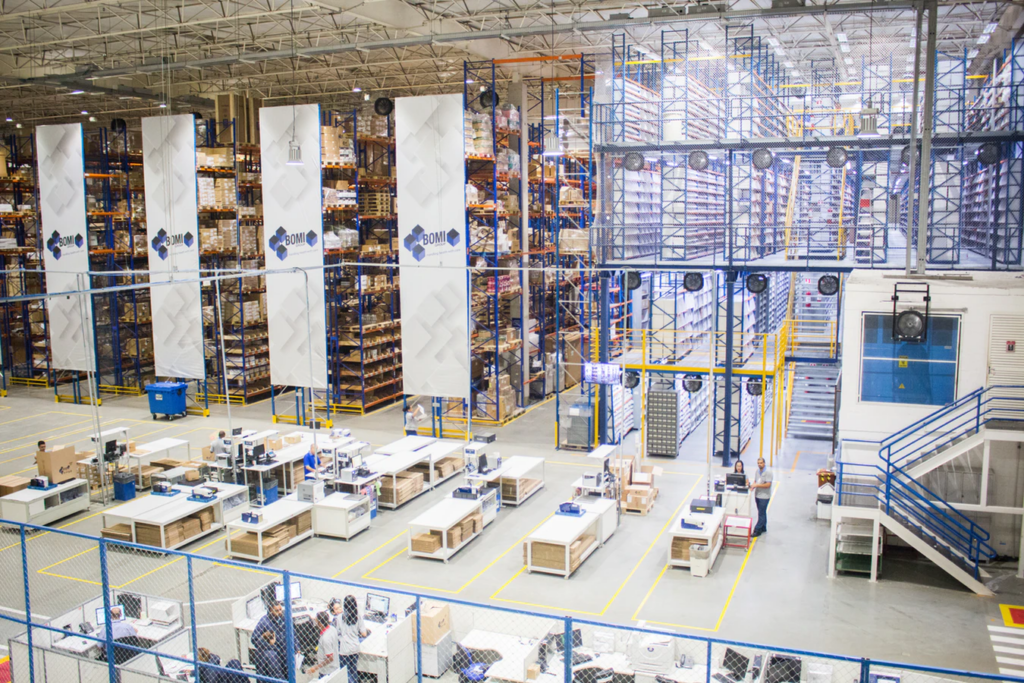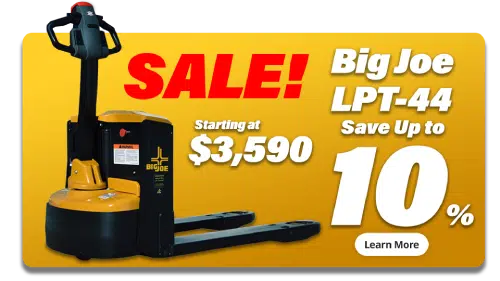Zero-Emission Forklift Regulation California – Impact On Your Fleet?
Understand CARB’s Zero-Emission Forklift Regulation in California which will phase out and restrict new purchases of Large Spark-Ignition (LSI) Forklifts and require usage of zero-emission forklifts in fleets
If you’re in the market for forklifts, especially in California, it’s important to understand the upcoming changes related to the Zero-Emission Forklift Regulation under California’s Title 13. The state is taking big steps to reduce emissions from forklifts powered by large spark-ignition (LSI) engines, and these changes could impact how, when, and what types of forklifts you can buy, operate, and maintain. Here’s a breakdown of what you need to know:
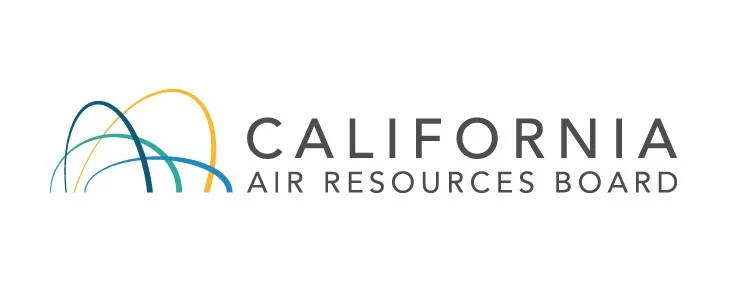
The Purpose of Zero-Emission Forklift Regulations
As California moves towards cleaner air, the state has enacted stricter regulations for large spark-ignition (LSI) forklifts in an effort to reduce harmful emissions like NOx, particulate matter (PM), toxic air contaminants, and greenhouse gases. The Zero-Emission Forklift Regulation (ZEF) aims to push for cleaner alternatives in the forklift industry.
Goal: To reduce harmful emissions like nitrogen oxides (NOx), particulate matter (PM), toxic air contaminants, and greenhouse gases (GHG) from forklifts powered by internal combustion engines.
Scope: This regulation affects forklift manufacturers, operators, and dealers in California. Certain forklifts, such as rough terrain models or those used in specialized operations (like military or emergency services), are exempt.
Zero-Emission Forklift (ZEF): A forklift powered by battery-electric, fuel-cell, or other zero-emission technologies. These are the future of forklift operations in California.
Class IV & V Forklifts: These are internal combustion forklifts with different tire types. If you have these in your fleet, you’ll need to be aware of the phase-out schedules and replacement requirements.
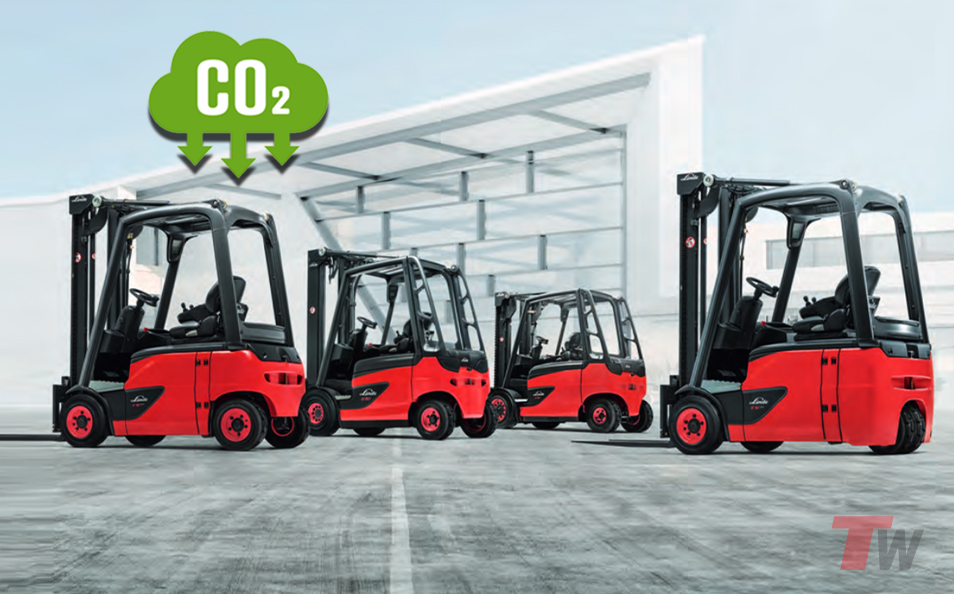
How Does This Impact Your Forklift Fleet?
As a forklift buyer in California, the Zero-Emission Forklift Regulation (ZEF) introduces key requirements that will impact your fleet:
Purchasing an LSI Forklift: Effective January 1, 2026, Fleet Operators in California will face restrictions on purchasing LSI forklifts unless 1 of the following conditions is met:
a. The forklift is a used model from the 2025 or earlier model year.
b. The forklift is a new 2025 model year LSI forklift, purchased before January 1, 2027.
c. The forklift is a Class V LSI forklift with a rated capacity of 12,000 lbs or more, which must be reported to the Executive Officer.
d. The forklift is a 2026–2028 model year Class V forklift, rented from a rental agency, and the rental occurs before January 1, 2038.
Operating an LSI Forklift: Starting January 1, 2026, Fleet Operators will be restricted from operating LSI forklifts in California unless:
a. The forklift is a 2025 or earlier model, in compliance with the phase-out schedule.
b. The forklift is a 2026-2028 model year Class V forklift, rented from a rental agency, and the rental occurs before January 1, 2038.
c. The forklift is a Class V LSI forklift with a rated capacity of 12,000 lbs or more.
Fleet Operators: What’s Changing?
Phase-Out of Old Forklifts: If you have forklifts that don’t meet zero-emission standards, you’ll be required to phase them out according to a set schedule. This starts in 2026 for certain forklift classes.
Acquisition Restrictions: After January 2026, operators can no longer purchase certain older models or internal combustion forklifts unless they are within specified exemption categories (e.g., heavy-duty forklifts with >12,000 lb capacity).
Inventory and Reporting Requirements: Operators must track and report detailed information about their forklifts. This includes labels with unique Equipment Identification Numbers (EINs) that must be affixed to each forklift.
Learn More at Zero-Emission Forklift Fleet Requirements Regulation by CARB
Phase-Out Provisions and Compliance Deadlines
Compliance Deadlines: The phase-out of internal combustion forklifts starts in 2026 and extends through 2038, depending on the model and class of forklift.
Replacement with Zero-Emission Models: Operators can replace old forklifts with zero-emission models to meet the regulations. Special credits are available for replacing forklifts over 12,000 lbs with zero-emission alternatives.
Infrastructure and Charging Requirements
Upgrading Electrical Infrastructure: By 2026, fleet operators must begin discussing with their utility provider to upgrade electrical infrastructure for charging or fueling zero-emission forklifts. This could involve installing new chargers and ensuring enough power is available for your fleet’s needs.
Documentation: You’ll need to provide estimates on the number and type of chargers you need, power requirements, and typical usage patterns.
Exemptions and Special Cases
There are several exemptions for forklifts under specific conditions:
Low-Use Forklifts: Forklifts used for fewer than 200 hours per year can be exempt from some of the phase-out rules, though they must still meet other reporting and labeling requirements.
Emergency Forklifts: Forklifts used exclusively for emergency operations are also exempt but must meet special reporting and usage guidelines.
Heavy-Duty Forklifts: Forklifts with a capacity over 12,000 lbs have different phase-out timelines and are not subject to the same requirements as smaller models.
Reporting Requirements
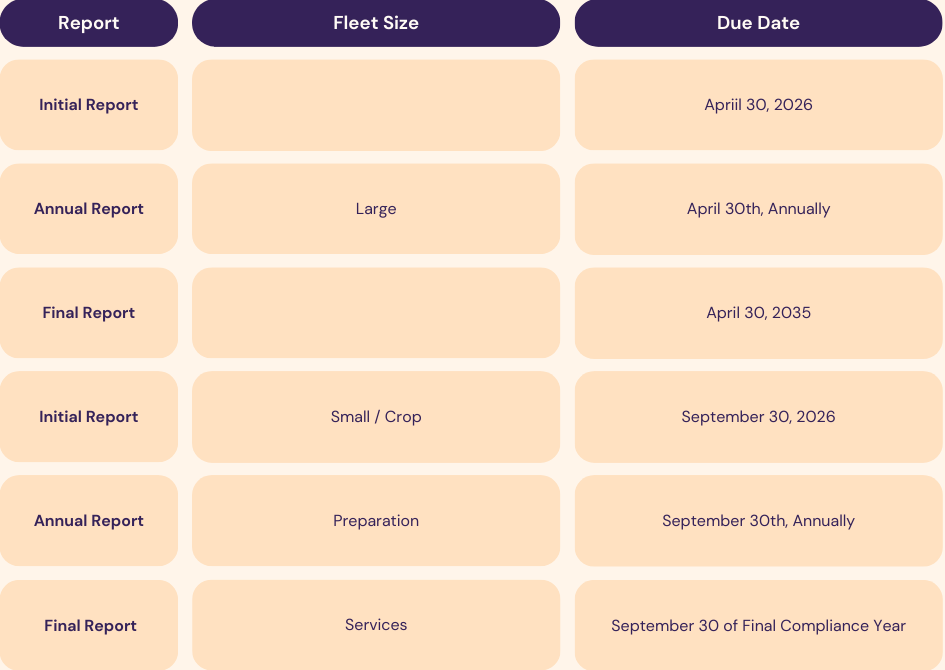
Comprehensive Reporting Framework for Forklift Fleet Electrification
The reporting structure encompasses three critical document types, each serving a distinct purpose in tracking fleet electrification progress:
Initial Report Essentials
– Provides foundational fleet documentation
– Captures comprehensive entity and equipment inventory
– Includes precise quantification of:
– Class IV LSI forklifts as of January 1, 2026
– Class V LSI forklifts as of January 1, 2026
– Mandates electric utility provider communication verification
– Highlights potential electrical infrastructure constraints
– For small fleets utilizing alternative phase-out schedules, requires:
– Detailed forklift specifications
– Precise operational location information
Annual Report Dynamics
– Serves as a progressive tracking mechanism
– Documents continuous fleet transformation
– Key components include:
– Entity and equipment inventory updates
– Electrical infrastructure capacity assessments
– Projected infrastructure limitations
– For small fleet alternative schedules, comprehensive documentation of:
– Forklift entry dates
– Operational addresses
– Zero-emission forklift additions
– Detailed removal information (EIN, removal dates)
**Final Report Confirmation:**
– Validates complete fleet electrification
– Separate submissions for Class IV and Class V forklifts
– Provides definitive phase-out completion verification
This reporting framework ensures systematic, transparent tracking of fleet electrification efforts across different operational scales.
Why Zero-Emission Forklifts Are the Future
If you’re thinking about upgrading your fleet, now is a great time to consider transitioning to electric forklifts. Here’s why:
Environmental Benefits: Zero-emission forklifts don’t produce exhaust, helping to reduce air pollution in California.
Compliance: Transitioning to electric forklifts ensures that you comply with state regulations, avoiding fines and penalties.
Cost-Effective: While electric forklifts may have a higher upfront cost, they offer long-term savings in fuel, maintenance, and environmental incentives.
How Can Total Warehouse Help?
Complimentary, Expert Consultation: We can help you understand which forklifts are right for your operations and ensure you’re compliant with California’s regulations.
Zero-Emission Options: We offer a range of electric forklifts that meet zero-emission standards and are ready to support your fleet’s needs.
Incentives: Electric forklifts often qualify for state incentives, tax credits, and rebates. We can help you navigate these opportunities.
Transition Support: As you phase out older forklifts, we’ll work with you to find suitable electric models and assist with the necessary infrastructure upgrades.
Contact the Energy Solution Team at Total Warehouse Today.
Conclusion: Preparing for the Zero-Emission Future
The Zero-Emission Forklift Regulation is a significant shift for forklift operators in California, but it also presents an opportunity to upgrade to cleaner, more efficient technology. By planning ahead, understanding the new requirements, and making the switch to zero-emission forklifts, your business can stay compliant, reduce its carbon footprint, and enjoy long-term savings.
Ready to upgrade your fleet? Contact us today to learn more about our electric forklift options and how we can help you make the transition smoothly!

At Total Warehouse, we can ensure that the process of going electric and participating in the LCFS program is extremely easy. Our experts provide comprehensive LCFS credit management and have helped countless businesses across the United States achieve lower maintenance, reduced costs, increased worker satisfaction, and increased economic sustainability by making the switch. Our team of highly knowledgeable experts can help you make the right decision for your business. Give us a call at 833-868-2500 or contact us online.

